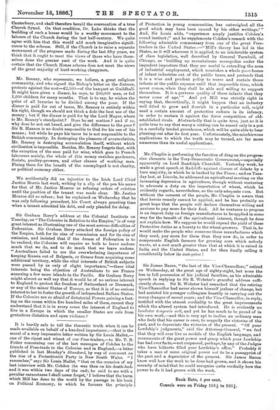It is hardly safe to tell the theoretic truth when
it can be made available on behalf of a hundred impostures ;—that is the moral of a very impressive letter written by Sir Louis Mallet,— one of the ripest and wisest of our Free-traders,—to Mr. T. B. Potter concerning one of the last messages of Cobden to the friends of Free-trade in the Colonies and in England,—a letter published in last Monday's Standard, by way of comment on the rise of a Protectionist Party in New South Wales. "I remember," says Sir Louis Mallet, "that on the occasion of my last interview with Mr. Cobden (he was then on his death-bed, and it was within two days of the end), he said to me with a peculiar earnestness I shall never forget, I believe that the harm which Mill has done to the world by the passage in his book on Political Economy, in which he favours the principle
of Protection in young communities, has outweighed all the good which may have been caused by his other writings." And, Sir Louis adds, "experience amply justifies Cobden's sound instinct ;" and he supplements Cobden's remark with the following admirable commentary from one of the groat Free- traders in the United States :—" Mill's theory has led in the States, as it will wherever it is applied, to an intolerable system of class legislation, well described by General Turnbull, of Chicago, as 'building up mountainous monopolies under the impudent imposture that they are useful ix extending the area of industrial employment, which nourishes a whole poor-house of infant industries out of the public taxes, and pretends that it is a wise and prudent policy to nurse and sustain those infants at the public expense until that impossible time, which never comes, when they shall be able and willing to support themselves. It is a perverse quality of these infants that they never come of age.'" And yet Mill was strictly right in saying that, theoretically, it might happen that an industry well fitted to grow and flourish in a particular soil, might need a certain amount of protective culture in its infancy, in order to sustain it against the fierce competition of old- established rivals. Abstractedly that is quite true, just as it is quite true to say that many a cutting can be reared only in a pot in a carefully tended greenhouse, which will be quite able to bear planting-out after its first year. Unfortunately, the mischievous applications to which the truth may be turned, are far more numerous than its useful applications.


































 Previous page
Previous page